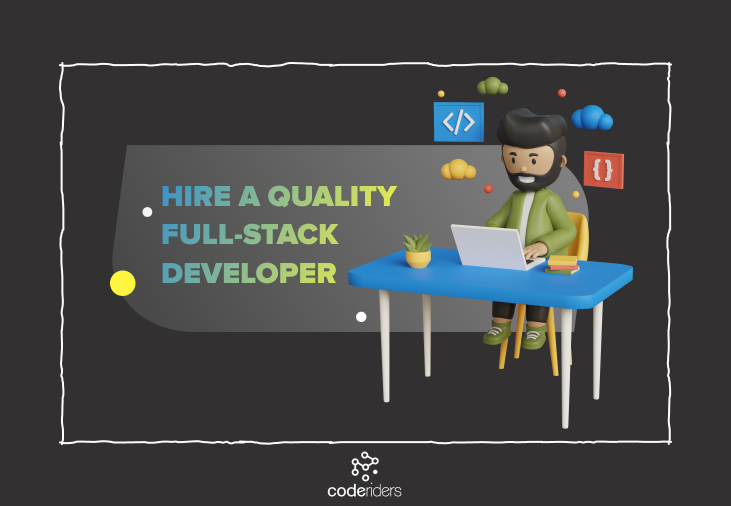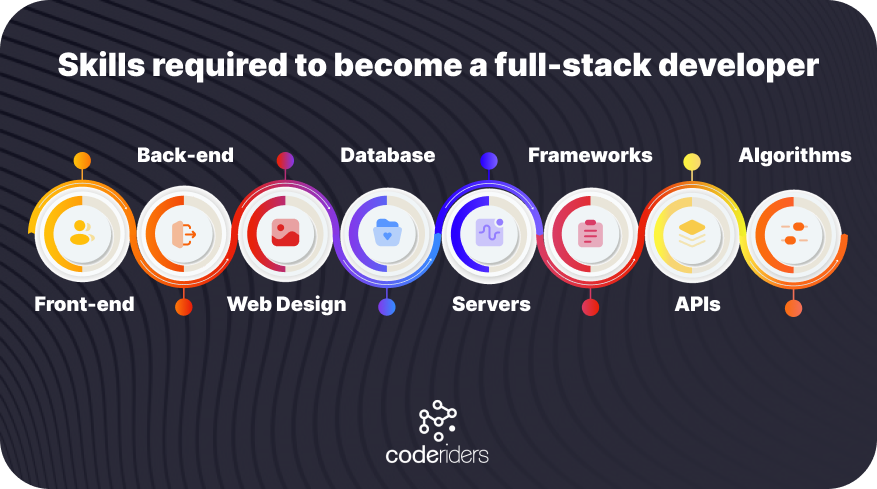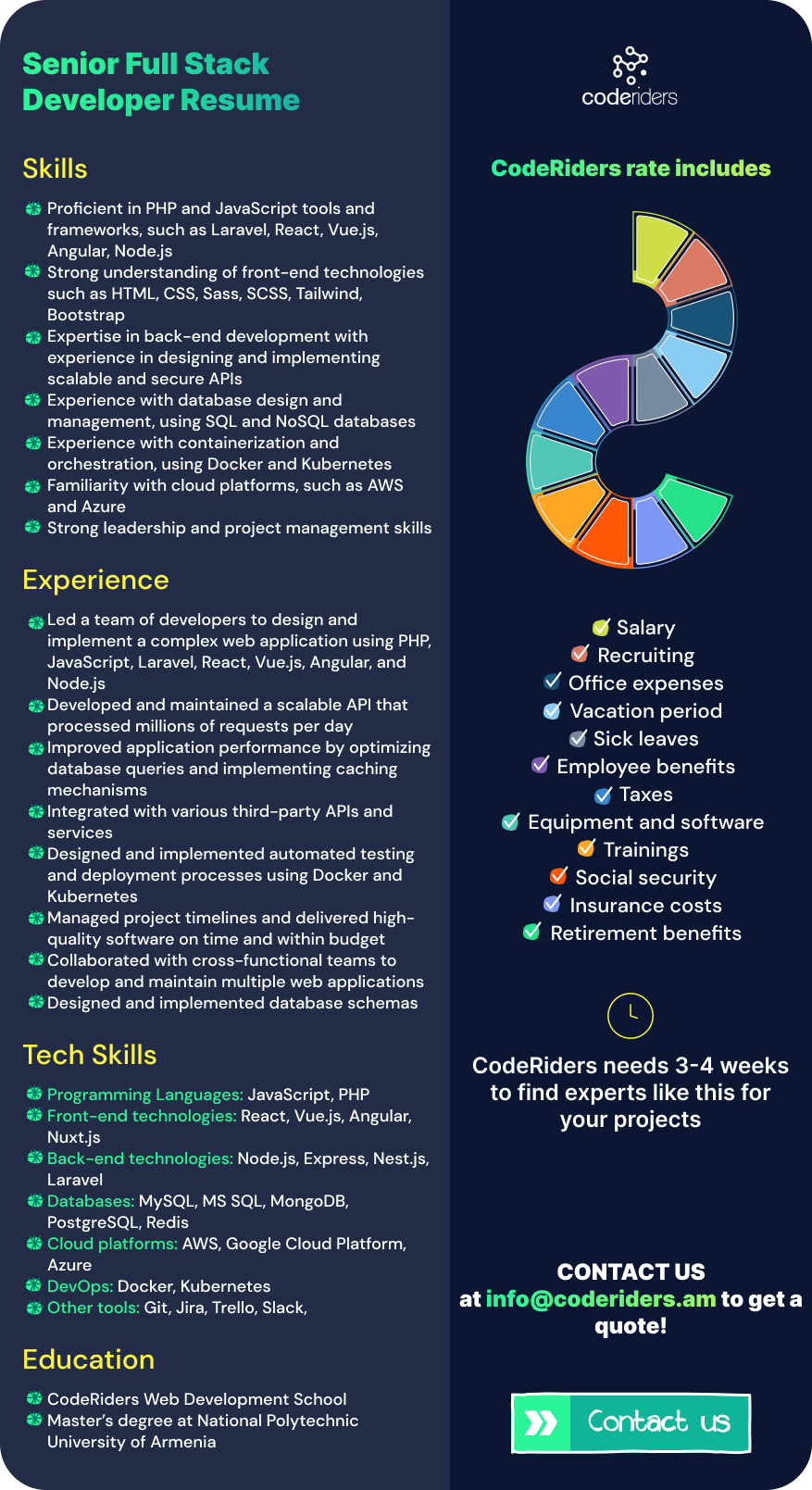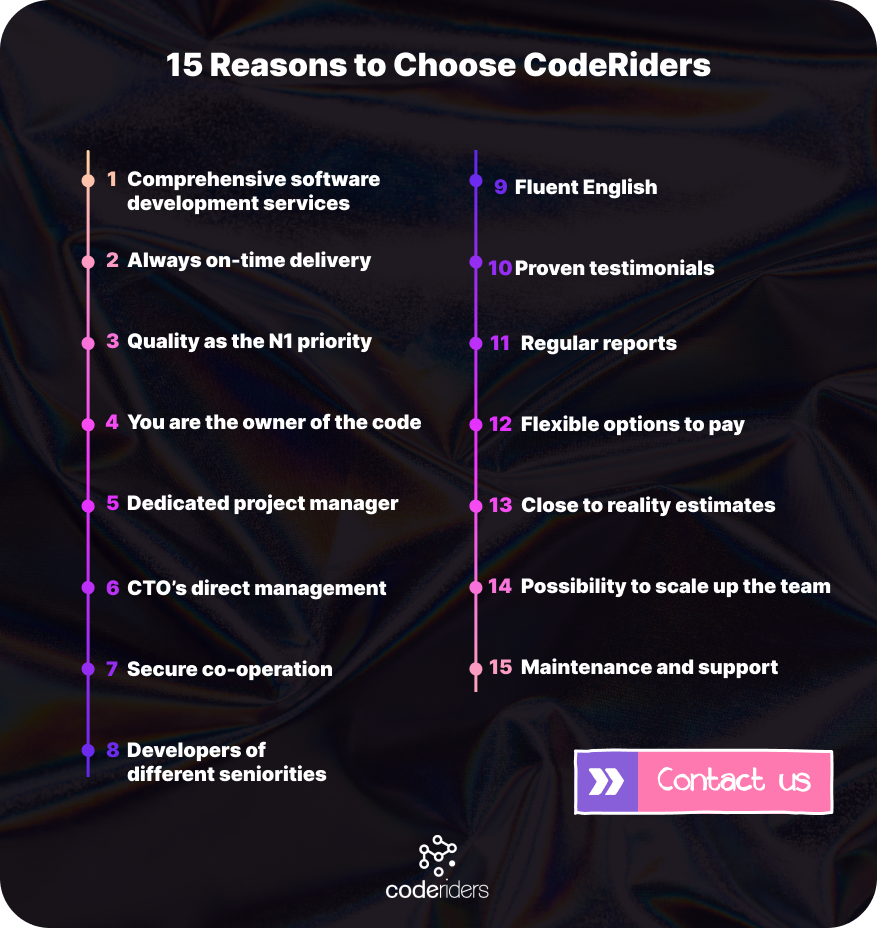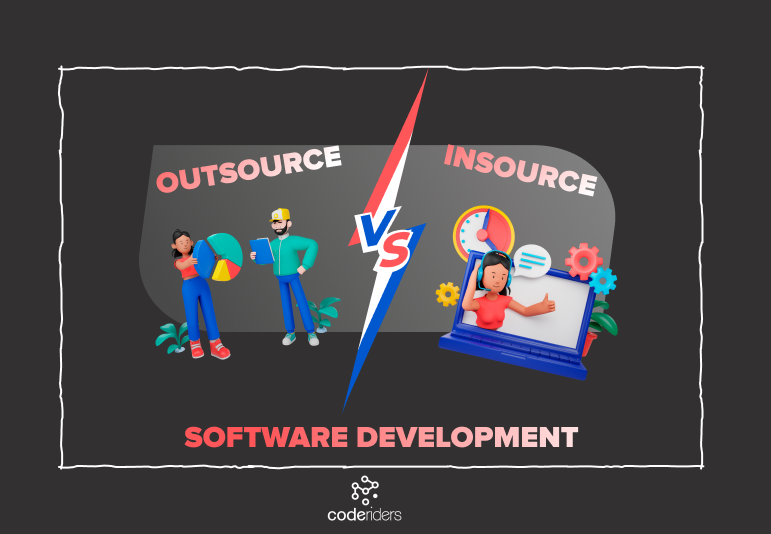As the demand for top-performing websites and web applications continues to rise, so does the importance of having a full-stack developer on your team. These professionals possess a comprehensive understanding of front-end and back-end web development technologies, allowing them to tackle all aspects of web development and bring your vision to fruition. In this article, we will explore why it is crucial to hire a full-stack developer, what skills to look for, and how to find the perfect candidate for your project.
What Is the Role of a Full-Stack Developer?
Full-stack developers are responsible for designing and creating websites and applications for different platforms. They work on both the front-end and back-end aspects of software development. They possess a diverse skill set, including database management, graphic design, and UI/UX development, enabling them to contribute to multiple areas of the software development process.
Full-stack software developers’ responsibilities may include:
- Developing and maintaining web services and user interfaces,
- Participating in front-end and back-end development,
- Developing APIs and RESTful services,
- Designing user interactions for web applications,
- Conducting tests, fixing software bugs, and troubleshooting issues,
- Ensuring cross-platform compatibility and performance,
- Considering factors such as security, maintenance, scalability, and more during the development process,
- Collaborating with other departments on projects and sprints.
The field of full-stack development is constantly expanding with new and innovative technologies, pushing the boundaries of what full-stack developers can achieve. Keeping up with the latest technologies and techniques is a thrilling aspect of this role.
According to LinkedIn's 2020 Emerging Jobs Report, the industries with the highest demand for full-stack developers are computer software, information technology and services, financial services, and higher education.
Full-stack Developer Skills
What are the main skills necessary for full-stack developers? Of course, the technologies depend on the developer’s preference, and one may not possess all of the languages and frameworks. Nevertheless, the main skill sets are as follows.
Front-end development
Front-end development involves creating the visual aspect of a website. This includes coding elements like drop-down menus, font styles, color schemes, and page layouts. Full-stack developers should be familiar with front-end technologies such as HTML, CSS, and JavaScript to ensure that websites and applications have a visually appealing and functional interface.
Back-end development
The expertise of back-end development involves utilizing programming languages such as PHP, Python, Ruby, Java, or C# and having a grasp on how algorithms and business logic operate.
Web design
Web design involves utilizing tools like Figma and Photoshop to generate and design graphics and themes. It is advantageous to have a basic understanding of UI design principles to construct navigational components, backgrounds, audio and video elements, and more. In general, they should possess some graphic design and visual communication skills.
Database management
Full-stack developers must possess knowledge of database management (for example, database storage solutions like JSON, SQL, and NoSQL), as it is an essential aspect of back-end web development. This includes the ability to design, comprehend, and execute database queries and web storage solutions.
Subscribe to Newsletters
Servers
Software engineers may build applications locally and then transfer them to the required server; therefore, they must be familiar with popular server software such as Microsoft IIS, Lighttpd, Apache, and NGINX.
Frameworks
Common programming libraries and frameworks include React.js, Laravel, Vue.js, Node.js, Angular, and Express.
APIs
To handle the interaction between front-end and back-end applications effectively, full-stack developers must be familiar with APIs (Application Programming Interfaces), as they provide a direct link between the two. Full-stack developers usually know APIs like REST and SOAP as well as protocols like HTTP.
Algorithms and structures
Having a solid grasp of algorithms and data structures will assist in writing efficient code, as it enables the creation of applications with intricate and logical designs.
Soft skills
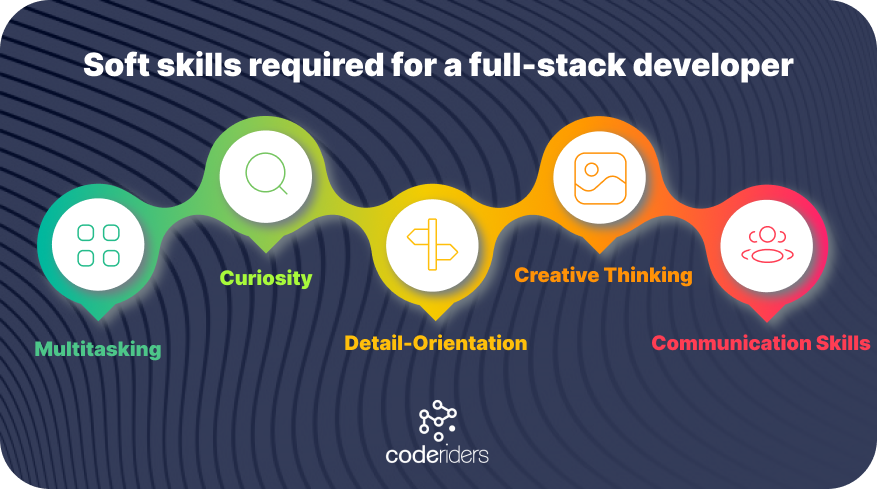
Besides professional skills, a good full-stack developer should also possess some soft skills necessary for this role. Personality traits of a great full-stack developer include the following soft skills:
Multitasking: The best multitaskers among web engineers are full-stack developers. They regularly switch between the back-end and the front-end, frequently juggling many duties at once. Full-stack developers need to possess great time management abilities and the capacity to prioritize, so they can complete the tasks on time.
Curiosity: Web development is fascinating. We may make a stunning, complicated web application that people will interact with in several ways. A great full-stack developer needs to be curious and intrigued by industry news and updates.
Detail-orientation: Full-stack developers are attentive. Before completing their work, they check it twice or three times to ensure that everything is accurate. They are meticulous perfectionists, and it shows in the well-written code and clear work they produce.
Creative thinking: To make their web application stand out from the competition, full-stack developers should do their best to think outside the box and come up with innovative ideas. Full-stack developers cannot work by duplicating the code that has already been done before. Each code needs an individual approach and way of thinking.
Communication skills: Back-end and front-end engineers frequently work in tandem with full-stack developers. Therefore, the latter must be excellent writers and vocal communicators to keep everything coherent.
Reasons to Hire Full-Stack Developers
When is a full-stack developer needed? It depends on the features and size of the software. For example, for a small-scale project, such as time-tracking software created by a small independent software development group, a single full-stack developer might handle the entire application. However, a substantial web application with growth potential will require a larger team, including back-end, front-end, full-stack developers, and other technical professionals.
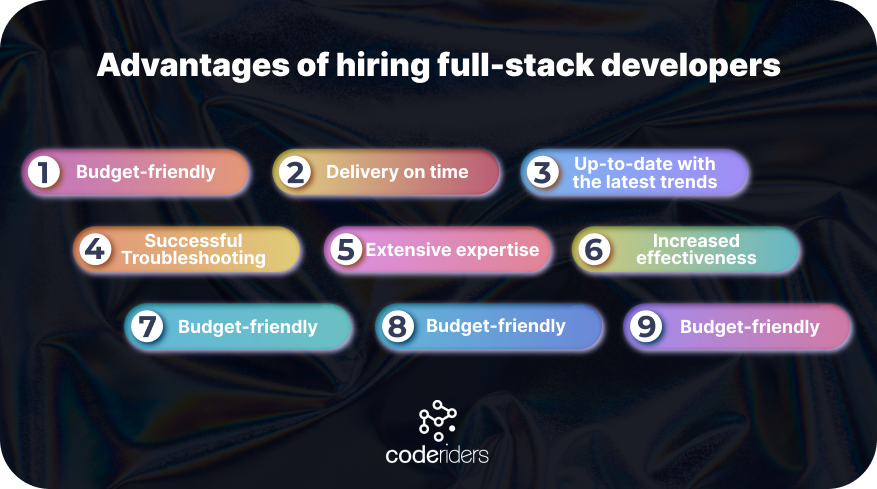
Let’s go over some reasons why full-stack developers may be needed for your project.
Budget-friendly
For some projects (especially small ones), hiring full-stack developers may be the best solution to meet the budget. In this case, you will have someone who will work both on the front-end and the back-end, not two individual specialists. Costs may be significantly reduced by hiring full-stack developers from a trustworthy full-stack development firm located in a budget-friendly tech hub (like Armenia).
Recommended: Is Armenia a Top Software Outsourcing Country?
Delivery on time
A full-stack developer oversees frontend and backend development at the same time. As a result, production is increased, and the product delivery is ensured on time.
Up-to-date with the latest trends
Due to the variety of projects full-stack developers work on, they gain specialized expertise and develop innovative solutions. Their knowledge of the most recent trends will be extremely helpful for software development, and their insights will be important in achieving greater performance.
Successful troubleshooting
By hiring a full-stack developer, companies solve two troubleshooting issues at once: problem identification and maintenance issues. They are skilled in resolving both problems and are familiar with the methods needed to do so.
Extensive expertise
Being multi-talented individuals, full-stack developers have the chance to work on a diverse range of projects, which provides them with a wealth of experience and knowledge. This exposure allows them to thoroughly understand project requirements and create innovative solutions. Their deep insights can significantly contribute to improved performance and increased market appeal for the projects, which developers with limited skills cannot provide.
Inreased effectiveness
Employing a full-stack engineer provides your company with the advantage of having a developer with a broad range of abilities. When front-end developers need support from back-end engineers during product development, it can result in a disruptive hierarchy and slow down the process. However, because full-stack web developers have a complete understanding of the technologies they use, they can identify and fix issues more quickly than other coders.
Subscribe to Newsletters
Icreased adaptability
Full-stack developers are experts in a wide range of technologies. As a result, they can readily adjust to any scenario and replace any team member during the software development lifecycle (SDLC). Therefore, full-stack development services enable increased flexibility, which may be a valuable asset to the firm.
All-in-one solution
Full-stack engineers are proficient in a variety of technology stacks. They are skilled in the front-end, back-end, database administration, and debugging. Hiring a specialized full-stack developer can, therefore, provide a one-stop shop for all areas of software development.
Simple upgrading
Full-stack developers will optimize your website and make the upgrade experience as simple as possible. They are fully aware of the digital innovations that are arising. They can quickly carry out your upgrade processes, ensuring that you stay on top of business and that your audience receives the most responsive website possible.
Front-End vs. Back-End vs. Full-Stack Web Developers
A full-stack web developer's responsibilities usually encompass the combined duties of front-end and back-end developers. To understand the duties that a full-stack developer may need to assist with, let’s first explore the responsibilities of front-end and back-end developers.
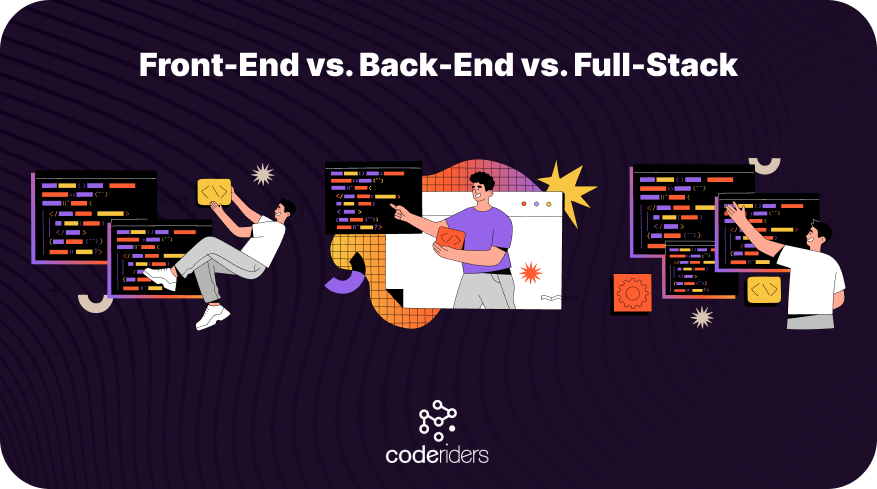
Front-end developers: Front-end developers are responsible for the user-facing parts of the system, including the interface, navigation, and visuals. They prioritize the user experience and use HTML, CSS3, and JavaScript to create an aesthetically pleasing result. They play a crucial role in creating the appearance of a website or application.
Recommended: JavaScript Powerful Benefits: Why Hire JavaScript Agencies?
Back-end developers: Back-end developers are responsible for the server and database aspects of an application. They build the framework that supports frontend development and uses languages such as PHP, Python, Ruby, Java, and C#. They also manage to store user information in the database.
Full-Stack developers: Full-stack web developers possess skills in both frontend and backend development, handling the overlap between the two. They use a wide range of programming languages, including those used by front-end and back-end developers, as well as others such as MySQL and machine learning (ML). Full-stack developers are responsible for ensuring a seamless overall experience by managing both frontend and backend elements.
Senior Full-Stack Developer Resume
Full-Stack Developer Salary
Full-stack developers are highly sought-after professionals in a rapidly expanding industry, and their salaries are generally high and even potentially lucrative. According to Payscale, the average salary for full-stack developers in the United States is $75,057, with an additional average of $4,300 in yearly bonuses.
According to Glassdoor, the average yearly salary of a full stack developer as of February 2023 is $85,558, excluding any additional compensation such as bonuses, commissions, or other types of payments that such professionals may receive each year. The anticipated supplemental payment for this job is around $6,062 annually.
LinkedIn's 2020 Emerging Jobs Report indicates that the employment outlook for full-stack developers is promising. The report explains that the rapid advancements in technology have elevated the importance of full-stack developers in various companies. According to LinkedIn, the occupation has been growing at an annual rate of 35% since 2015 and is projected to maintain this trend in the near future.
The overall comparison diagram showing the full-stack developer's yearly salary based on location and seniority level is as follows:
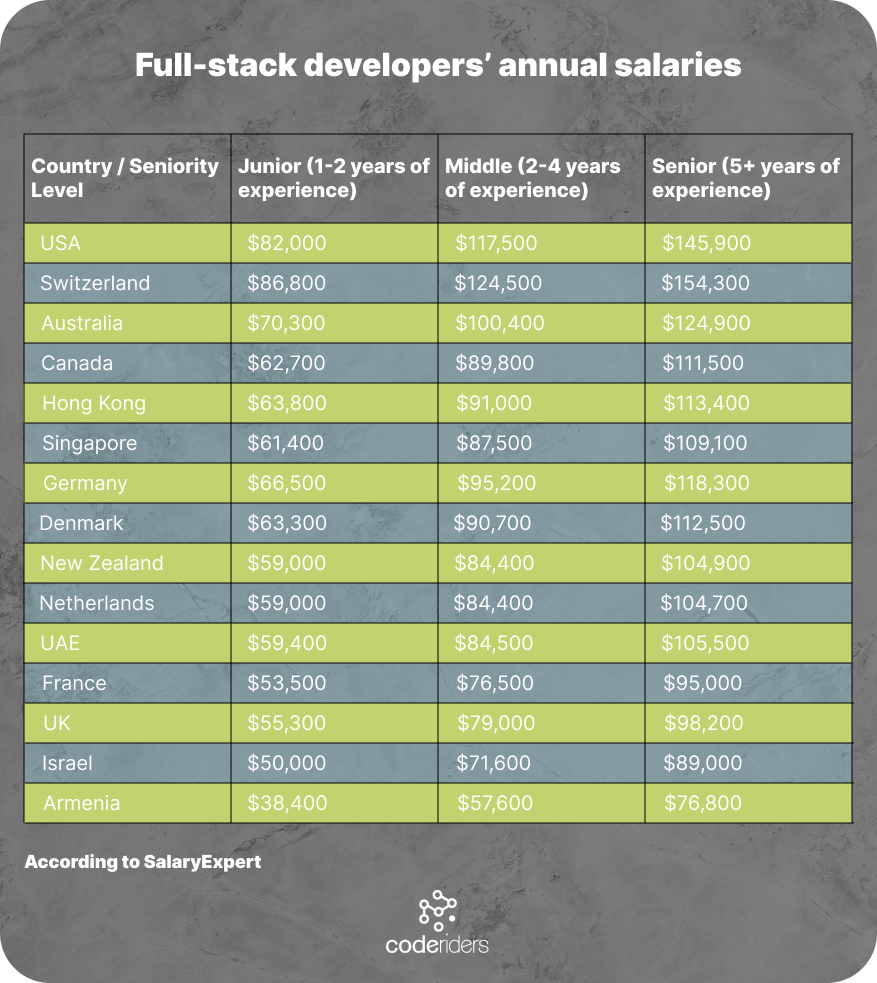
How to Hire a Full-Stack Developer?
Hire freelancers
Many full-stack software developers have registered accounts on reputable freelance platforms, such as Upwork, Toptal, and Guru. Freelancers want to have control over their fees and working hours, and ultimately, they can potentially earn more than in a regular job. Therefore, it is possible to find skilled professionals at mutually beneficial rates. However, if you do not receive a recommendation for a trustworthy freelance software developer, there is a risk of incomplete work or the possibility of putting your confidential data at risk.
Recommended: Dedicated Software Developers or Freelancers: Which is Better?
Hire in-house employees
This is a conventional and secure approach to hiring professional full-stack developers for your company. They will be available for eight hours a day, and you will be the one to manage their workload. However, you will need to bear the cost of salaries, equipment, office space rental, and other compensations. Additionally, there is not much flexibility when it comes to urgently expanding your development team, as recruiters may have to follow corporate procedures.
Outsource your software development
This cooperation model is popular among startups and small to medium-sized businesses (SMBs). However, even large corporations have begun to change their approach to assembling teams and have shifted to software development outsourcing. The reason is its cost-efficiency. With this hiring approach, businesses can use a pay-as-you-go payment plan, eliminating many administrative tasks related to recruiting, onboarding, supporting, and retaining new team members. There are many top-rated software outsourcing firms and popular software outsourcing tech hubs that are worth learning about.
Recommended: 5 Ways to Find a Reliable Software Vendor
Why Hire A Full Stack Developer From Armenia?
Talent
Armenia has made significant progress toward becoming a prosperous country with its impressive economic growth and rapid technological development. The internationally renowned magazine The Economist named Armenia "The Country of the Year" for 2018.
Perhaps not everyone is aware that Armenians are frequently linked to the world's mathematicians.
Since the collapse of the Soviet Union, Armenia has been a global leader in high-tech research, development, and manufacturing. Over 35% of all military electronics purchased by USSR nations came from Armenia, the industry's top supplier.
Armenia today continues to hold a leading position among CIS and Middle Eastern nations in the provision of technological goods and services.
Prices
Because of the ongoing changes and advances in Armenia's IT sector, industry rates are still fairly affordable when compared to service quality. Therefore, developer salaries in Armenia are substantially lower than in other well-known locations.
As you can see in the above infographic, Armenia’s yearly salary for full-stack developers is two or three times more cost-effective compared to countries like the USA, Switzerland, Australia, Canada, Hong Kong, Singapore, Denmark, New Zealand, the Netherlands, the UAE, the UK, Israel, France, etc.
The average annual salary for a full-stack developer in Armenia is $57,600. The hourly rates start from $20-$25, so there is always room to negotiate and find the best rate that fits your budget.
Recommended: Top Direct and Hidden Costs in Software Development OutsourcingÂ
Educational system
In Armenia, each year, over 1800 students graduate from universities that focus on information technology. As of 2022, over 30,000 people are employed in the ICT sector, and over 17,000 of them work for IT firms. One of the distinctive features of the Armenian IT industry is the high proportion of women in technology (45.2%).
Armenia is also one of the few nations in the world to provide a free public school with an IT focus that helps middle and high school students with classes in software and hardware development. For teenagers interested in learning about technology, there is the TUMO Center for Creative Technologies, a public technology and design school. Through practical activities, seminars, and workshops, teens are given the skills they need to design their learning paths.
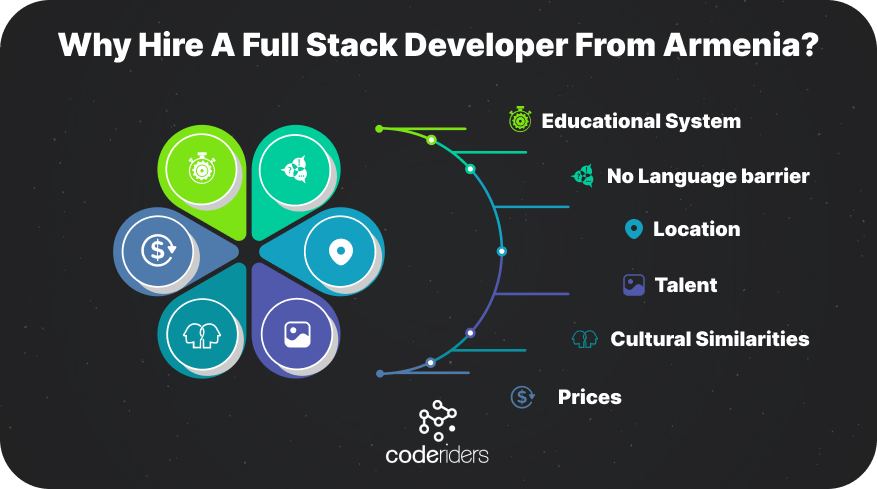
In addition to the country's public institutions and colleges, a lot of software firms provide IT classes to anyone interested in learning programming and technical skills. One of these companies in Armenia was CodeRiders. The company was actually founded as a software development school in 2013 before becoming known as one of the top bespoke software development firms in Armenia and the world. The school had one goal: to train and educate skilled software developers who could make an impact on the global software development market. Having over 800 students, we also decided to form our own custom software development firm, inviting the top 15 best students to CodeRiders to work with us on international projects.
Cultural similarities
When working with international companies, Armenians have no distinctive cultural or national differences. With an Armenian developer, communication is simple and pleasant. As a result, Armenian software development companies are more attractive to companies that build software remotely. The majority of IT companies welcome in-depth discussions and consultations, and CodeRiders is no exception. So, if you have any specific queries, feel free to contact us.
Location
Armenia is a small country in the Caucasus-Caspian region. The country is between Europe and Asia, having communication portals with both sides of the world. Armenia is in the UTC+4 (AMT) time zone. Therefore, there is very little or no time difference with Europe, the Middle East, and Africa (EMEA).
No language barrier
In Armenia, the official language is Armenian. The people here follow internationally accepted working practices and are fluent in multiple languages, typically English and Russian. As local software development firms very often work for international organizations and have business relationships with people from diverse backgrounds and nations, language knowledge in the ICT industry is necessary. Working in this field provides employees with a fantastic opportunity to continually improve their business communication and language skills.
At CodeRiders, besides English and Russian, we also have developers speaking Arabic and French. Therefore, when we have clients from these regions, they can communicate in their native languages as well.
Most of our developers communicate with the clients directly via meetings, calls, messaging, etc. Direct communication has proven to be the most effective project management practice at CodeRiders so far. However, if the clients require PMs to keep up the communication, we are also open to providing them.
CodeRiders Can Help You Hire a Full-Stack Developer
CodeRiders has been in the Armenian software outsourcing market for over 9 years, providing custom software development services to businesses worldwide. Clients can hire a full-stack developer from CodeRiders within a few weeks without having to worry about recruiting, onboarding, administrative, or accounting tasks or additional costs. It allows our clients to remain focused on their core workflows while we handle full-stack development responsibilities within our team.
Recommended: How It Feels To Work With CodeRiders
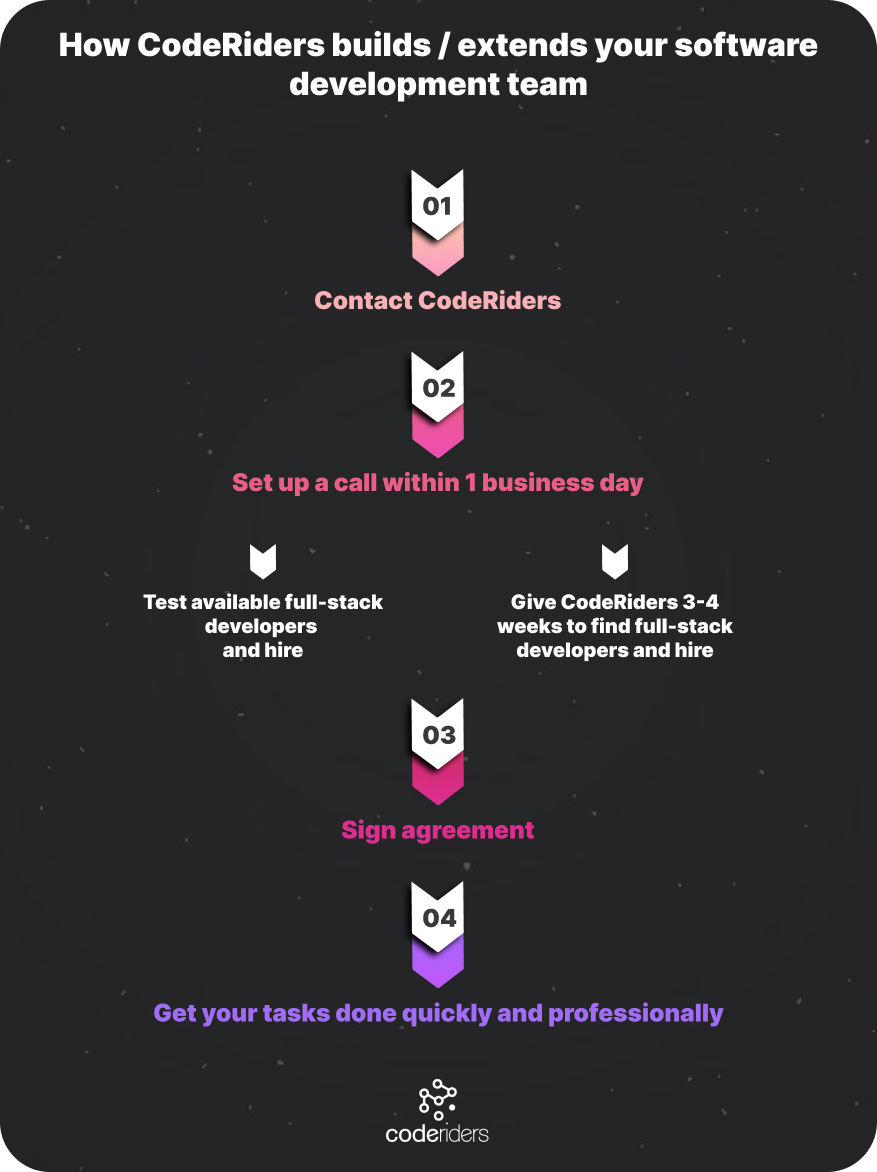
Let’s discuss a case when you may need to hire a full-stack developer. Here are the steps to obtaining the required professional with minimal input:
- You contact CodeRiders through our website or by emailing info@coderiders.am with the details of your request.
- Our business development specialists get back to you within 1 working day, either answering your questions in written form or scheduling a call to discuss the details. During this meeting, our business developers will understand your requirements for the position, gather information about your deadlines, and explain how we will work together. We will also determine how quickly we can assist.
- If we have immediately available people who meet your requirements, you can have them tested with interviews, technical assignments, or just a trial period. If everything goes as planned, we will sign a service agreement contract with you.
- If we do not have immediately available people for your project, we will create a job description and verify all the details with you to ensure everything is accurate and meets your needs. We will share the job description with our channels to get resumes as soon as possible. Within 1-2 weeks, we will provide you with shortlisted candidates with whom you can conduct interviews or assign test tasks. If their skills match your criteria, we will hire them in our team, and afterward, they can work on your projects. Our HR specialist takes care of the onboarding process and supports the new hire to help them adjust to your corporate culture.
If this sounds interesting, don’t miss your chance to hire full-stack developers from an internationally known tech hub. Contact CodeRiders now to get your quote.
Having
development
needs?
CodeRiders will address your web and mobile development challenges by creating custom software, helping with outsourcing services, or just consulting on your software development requirements.



